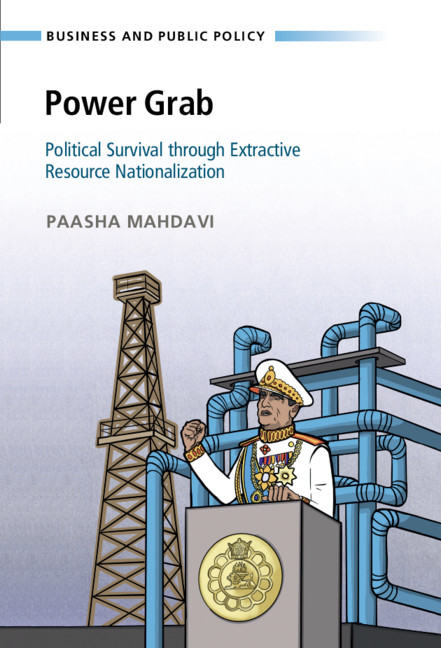
Rigged States


The ruler of a country with an abundance of coveted natural resources faces some tough choices when it comes to who will profit from them and how they will be extracted. Paasha Mahdavi, assistant professor of political science at UC Santa Barbara, suggests that many leaders, when faced with the prospect of taking control of their nation’s oil, metals and minerals, make decisions based on how secure they perceive their own power to be.
Mahdavi’s new book, “Power Grab: Political Survival Through Extractive Resource Nationalization” (Cambridge University Press, 2020), examines how leaders —especially dictators — keep their grip on power by seizing control of natural resource operations. By establishing state-owned enterprises, Mahdavi argues, leaders secure revenues that might otherwise flow to private firms, and they use this increased capital to secure political support when they feel they need it the most.
“The book presents a lot of data about how controlling the means of production of things like oil and minerals really determines the state of political leaders, their rise and fall,” Mahdavi said. “What’s crazy about it is that the decision leaders make to nationalize is a gamble. It’s a gamble because if you do it, you get a lot of money now, and that money helps you fortify the foundation of your rule, but you’re doing it at the expense of future money, future efficiencies and future investment in the economy.”
When faced with the prospect of nationalization, leaders must weigh the promise of wealth against the potential pitfalls of retaliation and inefficiency, Mahdavi said.
“A national oil company’s first objective is not profit but rather to satisfy the political strategy of their leaders,” he explained. “They have technically one shareholder — the state. That doesn’t necessarily mean long, stable production, especially with leaders who just want money now. Even the best national oil companies can’t compete at the highest end with multinational private companies.”
“Power Grab” compares the strategies (and outcomes) of different rulers in resource-rich nations faced with this conundrum throughout history. And while Mahdavi says that there are many different models when it comes to how a nation takes control of its resources, the boldness it takes to do so turns conventional wisdom on its head.
“The book speaks to why leaders behave opportunistically,” he said. “We used to think that leaders who don’t care about the future won’t survive long because they behave opportunistically and don’t invest in institutions that allow for economic growth. I’m saying well, no, those leaders take risks that ultimately let them stay in power for a long, long time.”
Mahdavi collected data for the book using some unique methods. One, Bayesian statistics, combines quantitative data with related narratives, like interviews. “Oftentimes, people treat those two types of information as separate,” he said. “My method brings them together. It gives you a more holistic view of the world. It’s not just the numbers on spreadsheets, but also people’s perceptions and expertise that you want to merge.” His approach revealed a more complete picture than numbers alone would have given him.
For Mahdavi, an interest in natural resources as they relate to politics has been a running theme throughout his life. When he was growing up, he had relatives who were directly affected by differing national politics related to resource extraction.
One uncle, a metals trader in Iran and now the UK, had his assets nationalized in Central Asia, receiving as compensation only a fraction of the amount they were worth. Two other uncles were pioneers in solar thermal technology for home water heating, and made Mahdavi aware of the weaknesses of the industry — namely, that the materials needed to make sustainable solar energy still had to be mined from a finite source.
“Those two childhood experiences got me on this track of thinking about energy from a political perspective,” he said. “The energy market is so vast that it has infinite potential for learning.”
As the U.S. becomes a nation increasingly reliant on renewable energy, Mahdavi believes that key issues of political power and resource management he explores in “Power Grab” could inform future economic decisions on a global scale.
“While the things that we need for the clean energy supply chain aren’t nationalized now, they have a lot of potential for nationalization, based on what happened in the oil markets in the past. If that happens, it would wreak havoc on our clean energy transition, because it would threaten the ability of renewables to compete on cost with fossil fuels,” he explained, adding: “We really have to understand the politics behind these resources. It gives us a sense of which resources we might want to diversify a bit so that this doesn’t become an issue.”



